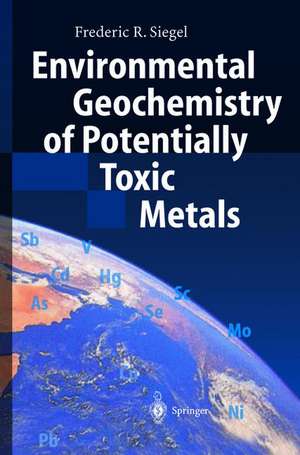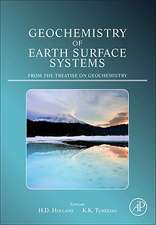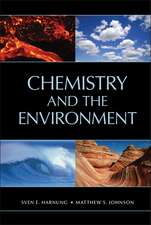Environmental Geochemistry of Potentially Toxic Metals
Autor Frederic R. Siegelen Limba Engleză Hardback – 23 oct 2001
| Toate formatele și edițiile | Preț | Express |
|---|---|---|
| Paperback (1) | 384.48 lei 6-8 săpt. | |
| Springer Berlin, Heidelberg – 30 noi 2010 | 384.48 lei 6-8 săpt. | |
| Hardback (1) | 390.25 lei 6-8 săpt. | |
| Springer Berlin, Heidelberg – 23 oct 2001 | 390.25 lei 6-8 săpt. |
Preț: 390.25 lei
Nou
Puncte Express: 585
Preț estimativ în valută:
74.68€ • 77.53$ • 62.27£
74.68€ • 77.53$ • 62.27£
Carte tipărită la comandă
Livrare economică 22 martie-05 aprilie
Preluare comenzi: 021 569.72.76
Specificații
ISBN-13: 9783540420309
ISBN-10: 3540420304
Pagini: 232
Ilustrații: XII, 218 p.
Dimensiuni: 155 x 235 x 18 mm
Greutate: 0.47 kg
Ediția:2002
Editura: Springer Berlin, Heidelberg
Colecția Springer
Locul publicării:Berlin, Heidelberg, Germany
ISBN-10: 3540420304
Pagini: 232
Ilustrații: XII, 218 p.
Dimensiuni: 155 x 235 x 18 mm
Greutate: 0.47 kg
Ediția:2002
Editura: Springer Berlin, Heidelberg
Colecția Springer
Locul publicării:Berlin, Heidelberg, Germany
Public țintă
GraduateCuprins
Geochemistry in Ecosystem Analysis of Heavy Metal Pollution.- Sources and Origins of the Metals.- Heavy Metals Mobility/Immobility in Environmental Media.- Pathways, Cycles: Bioaccumulation, Impact on Living Ecosystems.- Contaminant/Natural Background Values: Timing and Processes.- Indicator Media of Environmental Health Status.- Analysis of Indicator Media: Samples/Protocols.- Remediation/Alleviation of Metal(s) Contaminated Media.- Decision Making for Environmental Sustainability.
Recenzii
From the reviews:
"Environmental Geochemistry of Potentially Toxic Metals by Frederic R. Siegel is a well-organized text, which provides a good overview of the pertinent issues in studying heavy metals in the environment. … The figures and tables complement the text and wonderfully display such topics as uses of metals and the biogeochemical cycles of nutrients. … this is a useful text for geochemistry/ecology students and interested laymen who want to learn about the origin, transport, and sequestering of toxic metals." (Philip L. Verplanck, Mineralium Deposita, Vol. 38 (2), 2003)
"This book, containing 218 pages divided into nine chapters, gives, as the title indicates, an overview of the geochemistry of toxic metals. In the first section a clear definition is given of which metals are considered toxic, including an overview of effects on ecosystems. … this book is an interesting document for all scientists working in the field of metals. … There is much interesting information included, especially in the tables." (Jan Bronders, International Journal of Environment and Pollution, Vol. 19 (6), 2003)
"This book contains a lot of fundamental and actual scientific knowledge on environmental geochemistry of potentially toxic metals and related fields. Facts are presented in clear chapters divided into short sections, written in a concise and clearly understandable style. … The book is strongly recommended for students in many fields … and all those who start to work in the field of potentially toxic metals or are interested in this research. It is therefore a valuable and timely addition to the literature." (W. Calmano, Acta hydrochimica et hydrobiologica, Vol. 21 (1), 2003)
"This volume is a welcome addition to the field. … It sets out to provide a comprehensive overview of fundamental geochemical principles and their relevance to potential impact of potentially toxic metals on ecosystem function. … The text … presents a concise and focused treatment of the issues. … it is certainly the definitive overview of the environmental geochemistry of metal pollution. It is relevant to all practitioners, researchers and students of the subject … . An accessible, enjoyable and informative volume – strongly recommended." (Professor Andrew S. Hursthouse, Journal of Environmental Monitoring – online, March, 2003)
"Environmental Geochemistry of Potentially Toxic Metals by Frederic R. Siegel is a well-organized text, which provides a good overview of the pertinent issues in studying heavy metals in the environment. … The figures and tables complement the text and wonderfully display such topics as uses of metals and the biogeochemical cycles of nutrients. … this is a useful text for geochemistry/ecology students and interested laymen who want to learn about the origin, transport, and sequestering of toxic metals." (Philip L. Verplanck, Mineralium Deposita, Vol. 38 (2), 2003)
"This book, containing 218 pages divided into nine chapters, gives, as the title indicates, an overview of the geochemistry of toxic metals. In the first section a clear definition is given of which metals are considered toxic, including an overview of effects on ecosystems. … this book is an interesting document for all scientists working in the field of metals. … There is much interesting information included, especially in the tables." (Jan Bronders, International Journal of Environment and Pollution, Vol. 19 (6), 2003)
"This book contains a lot of fundamental and actual scientific knowledge on environmental geochemistry of potentially toxic metals and related fields. Facts are presented in clear chapters divided into short sections, written in a concise and clearly understandable style. … The book is strongly recommended for students in many fields … and all those who start to work in the field of potentially toxic metals or are interested in this research. It is therefore a valuable and timely addition to the literature." (W. Calmano, Acta hydrochimica et hydrobiologica, Vol. 21 (1), 2003)
"This volume is a welcome addition to the field. … It sets out to provide a comprehensive overview of fundamental geochemical principles and their relevance to potential impact of potentially toxic metals on ecosystem function. … The text … presents a concise and focused treatment of the issues. … it is certainly the definitive overview of the environmental geochemistry of metal pollution. It is relevant to all practitioners, researchers and students of the subject … . An accessible, enjoyable and informative volume – strongly recommended." (Professor Andrew S. Hursthouse, Journal of Environmental Monitoring – online, March, 2003)
Textul de pe ultima copertă
This book focuses on heavy metals that have damaged the ecosystem Earth and its life forms. It charcaterizes natural and anthropogenic sources of pollutants,identifies physical, chemical and biological conditions which affect their ecosystem mobility. The book describes the pathways by which potentially toxic metals can access and concentrate to toxic levels in organisms. The volume reviews the different environmental assessment, monitoring samples, and analytical techniques used to determine how sample types bond the metals and hence affect their bioavailability and bioaccumulation. Consideration is given to existing remediation methodologies and those being researched. Finally, the book emphasizes how pre-planning during project studies can result in the incorporation of technologies which will prevent or at least greatly alleviate the release of toxic metals to our living environment.
Caracteristici
Focus on potentially toxic metals in different ecosystems and on pathway by which metals can access organisms Didactic friendly Includes supplementary material: sn.pub/extras










